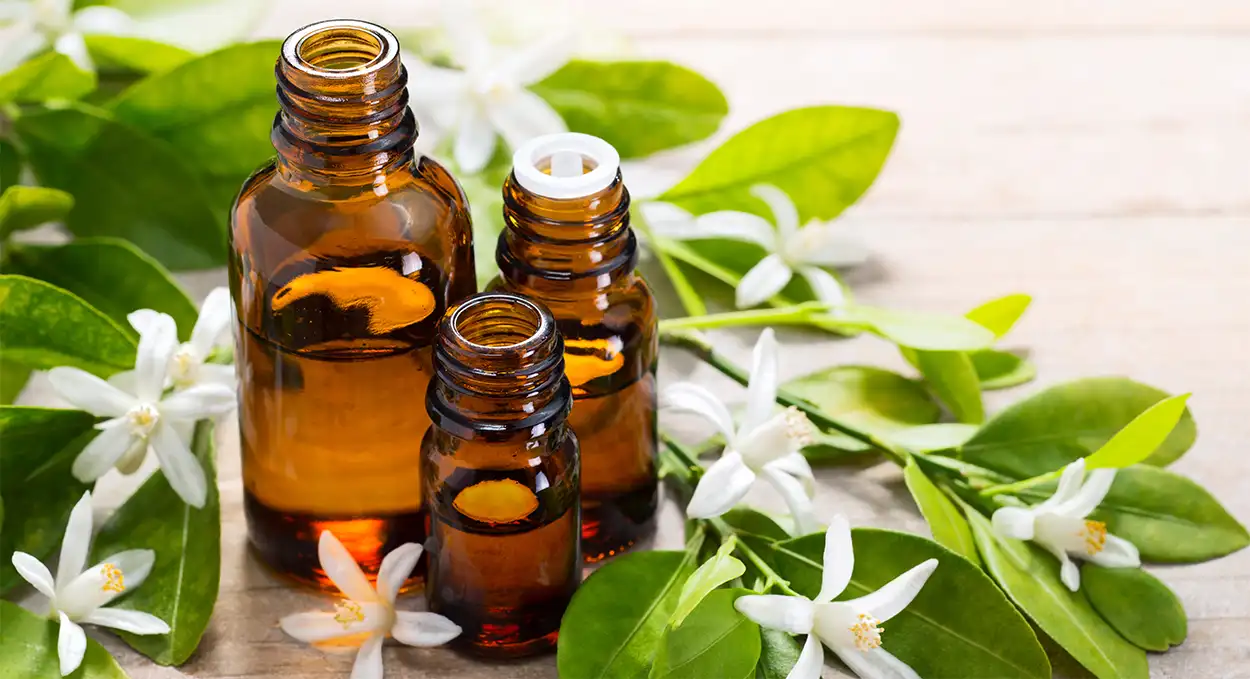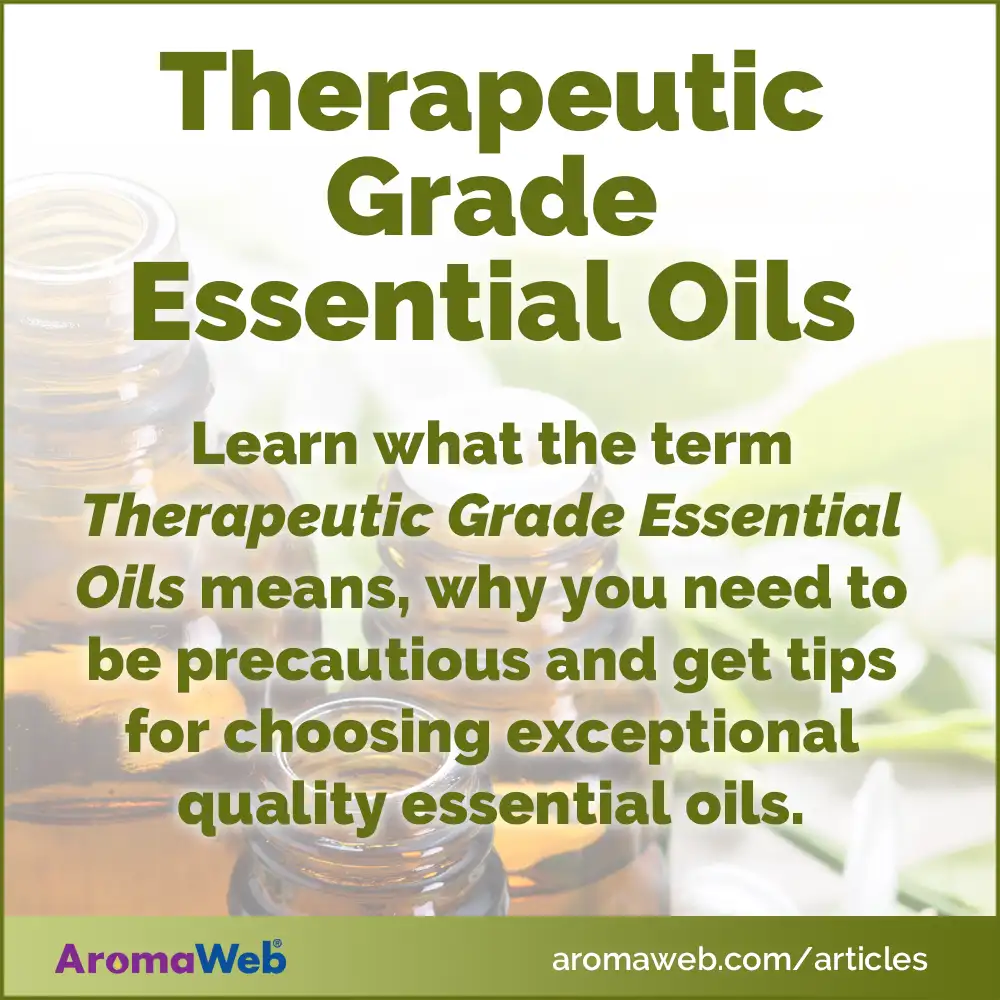Therapeutic Grade Essential Oils

No U.S. governmental agency or generally accepted organization grades or certifies essential oils as therapeutic grade, medicinal grade or aromatherapy grade in the United States. Therefore, the following terms are not regulated by any officially recognized governmental authority:
- Therapeutic Grade
- Medicinal Grade
- Pharmacy Grade
- Aromatherapy Grade
- Top Grade
- Grade A
Because no one independently grades essential oils or regulates the term Therapeutic Grade Essential Oils and the other terms in the United States, the terms don't have consistent meaning. Any company can make the claim that their essential oils are therapeutic grade regardless of the actual quality of the essential oils. I've even seen companies that sell fake essential oils claim that their oils are therapeutic grade. Therefore, it's really a term that buyers need to be cautious of.
Therapeutic Grade Essential Oil Recommendations for Consumers
Fortunately, many companies have begun using the term Therapeutic Quality to describe their essential oils. This transition omits the word grade which can mislead customers into thinking the oils are regulated or independently graded.
If you come across a company that uses the term therapeutic grade essential oils, it doesn't mean that the company is trying to be deceptive. However, the term itself is a bit meaningless. Therefore, it's important to attempt to assess what the company's particular intent is behind their use of the term and look for other key indicators of their essential oil quality. Some companies do provide details on their site that define their particular usage of the therapeutic grade essential oil terminology.
Use the tips within AromaWeb's How to Buy Essential Oils article to guide you on what to look for when considering suppliers. Companies that use the term therapeutic grade essential oils or the other similar terms may simply be trying to quickly convey to you that their oils were carefully chosen and tested for use by those practicing holistic aromatherapy. Some companies still have no idea that these terms are confusing.
Shopping Tips and Guides for Verifying Essential Oil Quality
Carefully read the below AromaWeb articles for tips that will help you evaluate companies that sell essential oils and help you better understand how to access essential oil quality:
- How to Buy Essential Oils
- How to Buy Aromatherapy Products
- Is All the Hype True?
- Guides to Verifying Essential Oil Quality:
- Part 1: Introduction
- Part 2: Why Is the Quality/Purity of an Essential Oil Important?
- Part 3: Aren't Most Essential Oils Pure?
- Part 4: Constituents - What do Essential Oils Consist Of?
- Part 5: Quality vs. Purity - Aren't They the Same Thing?
- Part 6: Quantifiable Testing of Essential Oils
- Part 7: GC-MS Test Results - How Can They Be Used?
- Part 8: Organoleptic Testing of Essential Oils
- Part 9: Other Quantifiable Tests for Testing the Quality and Purity of Essential Oils
- Part 10: Essential Oil Quality and Purity Conclusion: Final Questions/Answers
A Brief Background of Therapeutic Grade Essential Oil Terminology

I'm a long time member of the National Association of Holistic Aromatherapy. Upon renewing my annual membership many years ago, I spotted that their membership application/renewal form at that time prohibited membership to those companies that used therapeutic grade essential oils and similar terms to market or describe their essential oils.
It was that policy that lead me to then take a fresh look at the therapeutic grade terminology. I then realized how confusing these terms can be to consumers. Having said that, I have noticed that NAHA, under different leadership, no longer prohibits membership to companies that use these terms.
I first began studying aromatherapy in the 90s. I did not realize the potential confusion these terms can cause until I had inquired with NAHA's president at the time, Kelly Holland Azzaro.
By the time I first learned about holistic aromatherapy, a number of companies, including those that I otherwise find highly reputable, were using the terms therapeutic grade and/or aromatherapy grade to describe their essential oils. I didn't see anything malicious with these terms and the terms seemed to act as a way to quickly convey to consumers that the seller's essential oils were carefully sourced specifically for use by those seeking oils for holistic aromatherapy use.
Most essential oils are distilled and standardized for use in other industries, so those carefully sourcing and selling essential oils intended to be used for aromatherapy and therapeutic applications understandably want a way to convey the purity and quality of their oils for therapeutic uses.
Not all essential oils sold are suitable for aromatherapy or therapeutic applications. Soil conditions, seed quality, climate, altitude, growing conditions, harvesting, the care during distillation, bottling and storage can all play a part in the resulting therapeutic quality of an essential oil. And some essential oils are more cheaply produced and standardized for use in the food, flavoring or fragrancing industries. These are all factors that conscientious suppliers pay close attention to.
NUsing the phrase therapeutic grade essential oils has been a concise way for suppliers to designate that their oils were suitable for use by those seeking oils for use in holistic aromatherapy.
Though I'm a skeptical sort, I didn't originally find anything concerning about companies that used these terms. After much more careful thought back at the time I noticed NAHA's previous stance in prohibiting companies who used the therapeutic grade type terminology from joining NAHA, I realized how truly meaningless and confusing these terms actually can be.
Terminology Recommendations for Essential Oil Suppliers
I realize how difficult it can be difficult for some companies to go back and change all the many therapeutic grade oil references they have in use on their website, essential oil labels and other materials.
For those businesses that want to replace their use of therapeutic grade terminology, the term therapeutic quality helps to convey the intent without implying that essential oils are officially graded.
